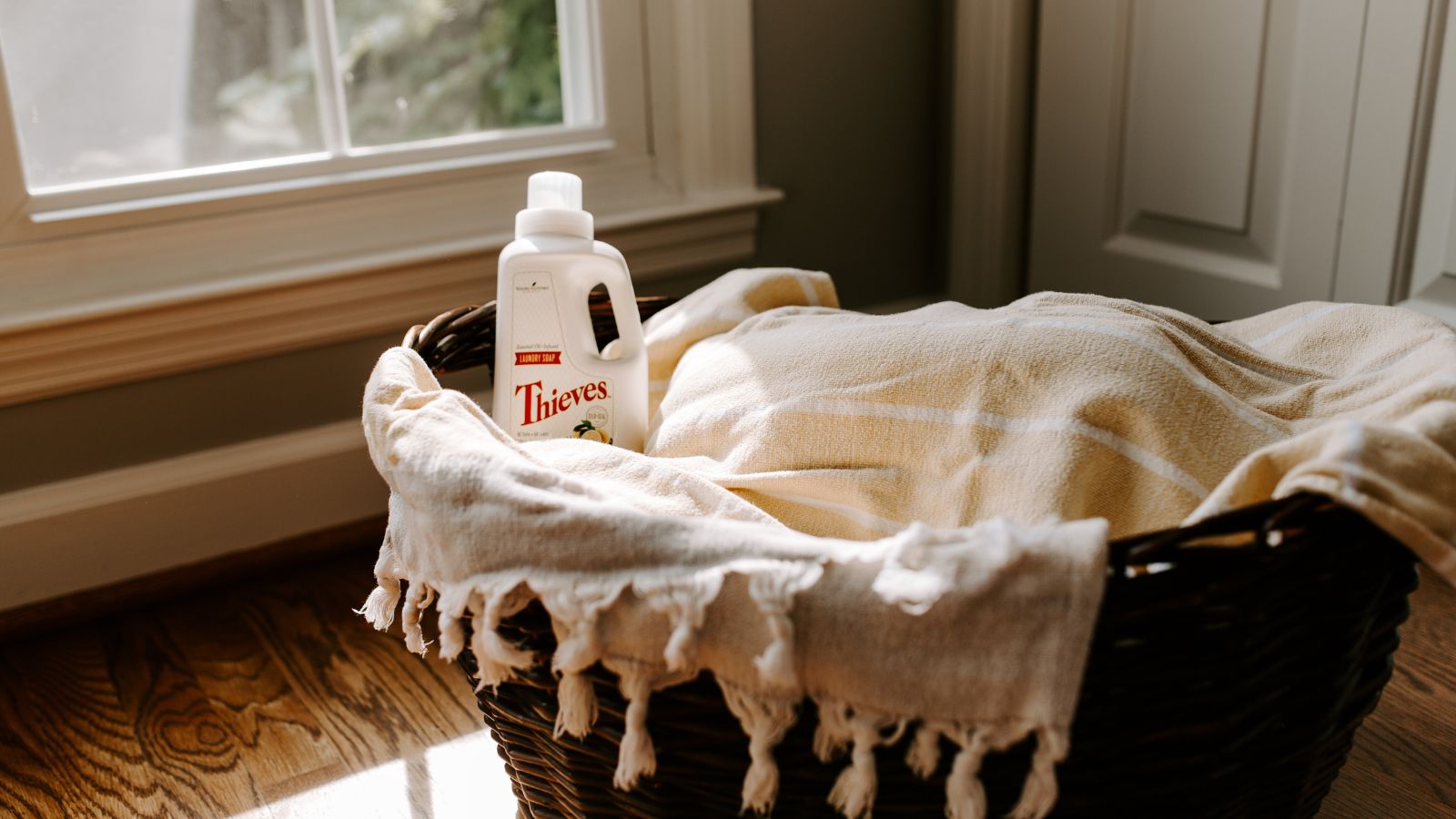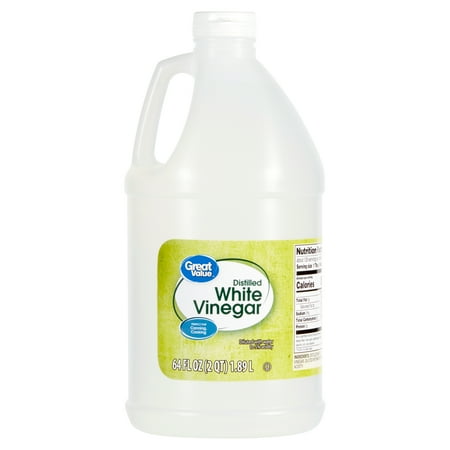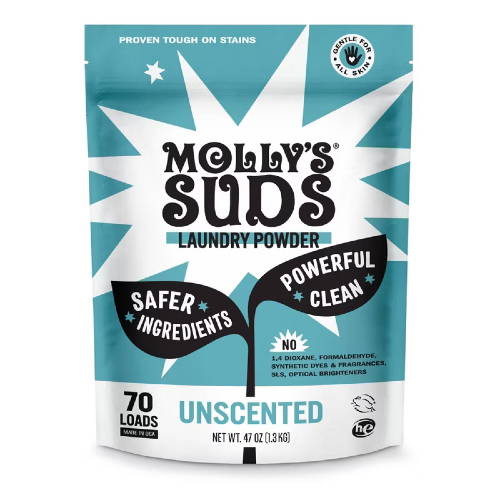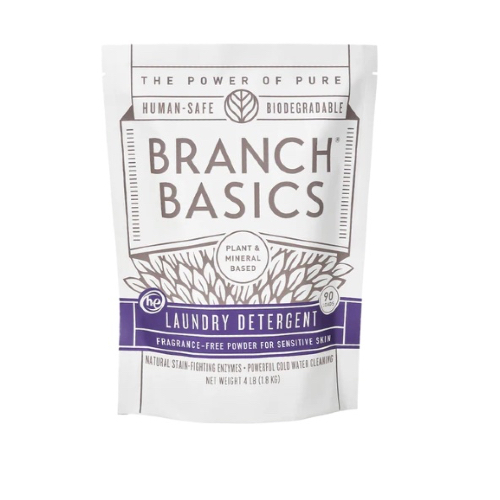6 critical signs your laundry detergent is causing 'mood swings, fatigue, and inflammation' – experts urge you to switch to non-toxic alternatives
Convenience does not equal safety, experts warn


It's easy to reach for conventional laundry detergents, they're cheaper, convenient, and often scented to tempt us to use them. They promise numerous washes and that they're great for 'sensitive skin', but are they actually?
These products, packed with harmful chemicals like surfactants and ethanol, are detrimental to both our health and the environment.
With the help of doctors and a dermatologist, we look at the key warning signs that suggest you need to get rid of this toxic laundry room item and switch to non-toxic detergents to protect your home and health.
Signs you should switch your detergent
While you should never wash clothes without detergent, reading up on the cleaning product ingredients to avoid is a must to keep your laundry safe.
1. Itchy skin and breakouts

Washing bedding with astringent detergents can have a detrimental effect on your skin health.
Dr. Tingting Tan, MD, PhD, medical oncologist and hematologist at City of Hope in Newport Beach, California begins, 'The first sign that your laundry detergent is causing issues is typically any skin irritation since this is the first area to usually react. Contact allergies to laundry detergent are rare, however, skin irritation can be common.'
Dr. Hannah Kopelman, a dermatologist at Kopelman Aesthetic Surgery agrees, 'One of the most common signs is skin irritation, including rashes, itching, or eczema flare-ups. Residue from harsh detergents can linger on clothing and bedding, leading to prolonged exposure and discomfort.'
Tingting continues, 'Laundry detergent is a household staple that has been under scrutiny in recent years for its use of possible toxins. A few of the chemicals that are found in laundry detergents are PFAS (more commonly known as 'forever chemicals'), fragrances, dyes, phthalates, and 1,4-Dioxane.'
When doing laundry with sensitive skin, invest in detergents that are free from dyes and fragrances, such as Ecover laundry detergent, available at Amazon, which was formulated with dermatologists to clean without harsh chemicals. I swear by it as an eczema-prone household, and my grandmother uses it to help with my grandfather's respiratory condition.
2. Feeling congested

If your bedroom does not suffer from dry air, stuffy noses could be a result of toxic detergents on your bedding.
Respiratory issues are another red flag. Stuffy noses or existing conditions such as asthma suddenly getting worse when you change from one detergent to another that's a good indication that you need to investigate.
Dr. Mario Padron, physician, founder, and medical director of Focus ADHD Miami explains, 'If you wake up with a stuffy nose, watery eyes, or general congestion, your bedding might be coated in detergent residues that contain artificial scents and irritants. Your body doesn’t need to be fighting allergens while you sleep.'
Mario recommends looking for a fragrance-free detergent like Seventh Generation Free & Clear from Target, 'It’s free from synthetic perfumes and dyes that can trigger allergies.'
To strip bedding of old detergent build-up, consider using white vinegar in laundry, and adding one cup to the detergent drawer before running a cycle to help remove product build-up for toxin-free sleep essentials.

You can also wash towels with vinegar to help strip product build-up. Vinegar cuts through old grease to make fibers softer, especially if you then dry towels and bedding naturally, or in a dryer with non-toxic dryer sheet alternatives like wool dryer balls.
3. Clothing or bedding starts to feel scratchy

Acing your closet organization ideas will also help to keep clothes softer for longer by reducing wear and tear.
Dr. Mario Padron continues, 'If your items feel oddly stiff or leave you feeling scratchy, your detergent could be too harsh – or worse, it’s not rinsing out properly, leaving chemicals embedded in your fabrics.'
Dr. Hannah Kopelman adds, 'Start by washing your clothes and bedding with a fragrance-free, non-toxic detergent and running an extra rinse cycle to remove any lingering residue. Avoid using dryer sheets, which often contain synthetic fragrances and coatings.'
Have a look at Hannah's top three non-toxic detergents below, they clean effectively without harmful ingredients.

This fabulous brand was created by a pediatric nurse and mom and is free from all the toxic nasties that include 1,4-dioxane, formaldehyde, synthetic dyes and fragrances, SLS, and optical brighteners. Made from earth and plant-derived active cleaning ingredients it's gentle on your skin and is very effective with a 5-star rating on Target.

Certified by PETA, this laundry detergent also has no ingredients of concern according to EWG (Environmental Working Group). Unscented for those who are sensitive to scents, it's made using plant and mineral-based ingredients. If you do like a scent there are six to choose from.

Free from hazardous pollutants and skin irritants, this laundry detergent is free from all the nasties including optical brighteners, ammonia, and endocrine disrupters. One scoop is enough per wash and it has a reliable performance in hard water settings and can be used on a cold wash.
4. Bad sleep

Changing detergent is just one way to sleep better. Investing in the best mattress and best pillows goes a long way, too.
Believe it or not, you can get poor sleep from toxic laundry products.
Dr. Mario says, 'Synthetic fragrances and lingering detergent chemicals can create a low-level irritant effect, disrupting your nervous system and making it harder to settle into deep sleep.'
For those who do have this issue try washing your sheets with Tru Earth's compact laundry detergent sheets from Amazon, they're hypoallergenic, paraben, and phosphate-free. Another bonus is they come in strips. Making them a great cleaning trick to reduce plastic and are ideal for travel too. They are a laundry room essential everyone needs, according to the pros.
5. Clothing color is fading and signs of breaking down

Knowing which clothing items you should hang up and which to fold will also go a long way in keeping your clothes looking their best.
With today's technology clothes don't tend to fade like they might have say over a decade ago, so if they do start to in certain places, then this is a good sign that your laundry detergent could be starting to affect your clothing.
Dr. Mario continues, 'If your favorite t-shirts are looking worn out too quickly or your leggings are losing their elasticity, your detergent could be too aggressive. Some formulas strip fabrics of their natural oils and break down fibers prematurely. Switch up to The Laundress Signature detergent from Amazon instead – it's specifically designed to clean effectively while protecting fabrics from unnecessary wear and tear.'
It is worth noting that deteriorating clothing could also be a sign that you are washing them on the wrong washing machine settings or too high of a temperature. Checking the laundry symbols on the care tag will help guide you in the right direction to preserve your garments.
6. Hormonal imbalances

Your laundry room might be hiding several toxic items to get rid of asap, inspiring a good declutter.
A 2022 study determined that nearly two-thirds of the common household cleaning products (including synthetic detergents) they tested contained more than one endocrine-disrupting chemical. I.e. chemicals that can affect your hormones, potentially impacting your health, development, and fertility.
We spoke to Jodie Louise, founder of Jodie Louise, a holistic wellness mentor and detox specialist who helps women heal digestion and balance hormones.
She explains, 'Many conventional laundry products are loaded with synthetic fragrances, endocrine disruptors and toxic chemicals that can mess with both hormones and digestion. These products often contain phthalates, parabens, and synthetic musks, which mimic estrogen in the body and throw the endocrine system out of balance. This can lead to mood swings, fatigue, irregular cycles, and even fertility issues over time.
'Over time, this burden can overwhelm the liver, disrupt gut bacteria, and contribute to bloating, inflammation, and sluggish digestion. Switching to natural, fragrance-free, or essential oil-based laundry products is such a simple yet powerful way to support the body’s balance.'
We like Attitude's Liquid Laundry Detergent, from Amazon, it is Environmental Working Group (EWG) Certified meaning it meets their strictest standards for health and safety and has a 4.3/5 consumer rating.
FAQs
What should people look for in a non-toxic detergent?
Get really good at reading labels and checking out company credentials.
Dr Hannah Kopelman explained, 'A good non-toxic detergent should be free from synthetic fragrances, dyes, sulfates, and harsh preservatives. Look for plant-based or biodegradable formulas that use natural enzymes or coconut-derived surfactants to clean without irritation. Hypoallergenic, fragrance-free, and dermatologist-tested options are ideal for sensitive skin. Certifications like the Environmental Working Group (EWG) Verified or USDA Organic can also indicate safer formulations.'
Is it possible to use DIY or natural alternatives to store-bought detergents?
We're big advocates for using natural cleaning products. Dr. Hannah Kopelman advises using the following ingredients mixed together:
- Arm & Hammer's super washing soda, household cleaner and laundry booster, 55 oz, on Amazon – this fragrance-free and phosphate-free washing soda neutralizes and eliminates odors and helps to brighten clothing
- Baking soda – Walmart's Great value baking soda, 1Ib is one of nature's best cleaners and is always worth having in your pantry
- Dr. Bronner's Magic pure castile liquid soap, 32 fl oz at Target gets fantastic results, you can opt for a scent like peppermint or lavender or opt for unscented if you prefer
- White vinegar – we love Iberia's distilled white vinegar, 32 fl oz on Amazon, you can use it for both cooking and cleaning.
Once you've washed your laundry there's also the drying aspect to consider. Dr. Hannah recommends, 'Wool dryer balls (try the Handy Laundry Store's wool dryer balls, pack of 6 from Amazon) infused with essential oils can replace chemical-laden dryer sheets while keeping fabrics soft and static-free.'
Meet our experts

Dr. Tingting Tan, M.D., Ph.D., is internationally renowned for studying the molecular signaling pathways in tumor development and the mechanisms of chemotherapy resistance. She is board-certified in medical oncology, hematology, and internal medicine.

Dr. Hannah Kopelman has completed two clinical fellowships in dermatology – hair loss from Columbia University and skin cancer from Boston University. She hosts a weekly dermatology podcast called Derm Club.

Dr. Mario Padron is a physician, attorney, and veteran. He obtained his medical degree at Des Moines University in Des Moines, Iowa. He is the founder and medical director of Focus ADHD Miami and Focus ADHD Indy.

Jodie Louise is a holistic wellness mentor, detox specialist, and conscious entrepreneur dedicated to helping women heal their digestion, balance their hormones, and unlock true vitality.
It's easy to put reactions down to something you've eaten, a spot of pollution, or a change of moisturizer, for example. We tend to not consider laundry detergents as being a cause because we can take for granted that they're not harmful, but once you start to read the ingredients and do a little research things start to make sense. Switch detergents when doing laundry for a couple of weeks and see if there's a difference, cutting out bad laundry habits one at a time until you see a difference in your health.
Chemical-laden detergent is another item to add to the list of toxic household items I have stopped buying.
Sign up to the Homes & Gardens newsletter
Design expertise in your inbox – from inspiring decorating ideas and beautiful celebrity homes to practical gardening advice and shopping round-ups.

Sophie has been an interior stylist and journalist for over 20 years and has worked for many of the main interior magazines during that time, both in-house and as a freelancer. On the side, as well as being the News Editor for indie magazine, 91, she trained to be a florist in 2019 and launched Flowers Inside My Head where she curates beautiful flowers for modern weddings and events. For Homes & Gardens, she writes features about interior design – and is known for having an eye for a beautiful room.
You must confirm your public display name before commenting
Please logout and then login again, you will then be prompted to enter your display name.
-
 Gwyneth Paltrow's quiet luxury kitchen is so beautiful, we almost overlooked her ultra-smart cabinets – they make the use of 'every inch' of storage space
Gwyneth Paltrow's quiet luxury kitchen is so beautiful, we almost overlooked her ultra-smart cabinets – they make the use of 'every inch' of storage spaceThe Goop founder makes use of dead space in her kitchen with customized cabinetry that reaches to the ceiling, providing ample storage
By Hannah Ziegler
-
 Martha Stewart's intelligent cabinets 'take every inch into consideration' – their 'visually light' style will solve your small kitchen storage problems
Martha Stewart's intelligent cabinets 'take every inch into consideration' – their 'visually light' style will solve your small kitchen storage problems'Every kitchen can be beautiful and functional, no matter what the size': 9 years since sharing her clever storage, Martha's cabinets are just as beautiful
By Megan Slack
-
 I've spent over 200 hours testing vacuums and swear by my two Dysons – this is how I properly clean a Dyson vacuum filter for longer-lasting appliances
I've spent over 200 hours testing vacuums and swear by my two Dysons – this is how I properly clean a Dyson vacuum filter for longer-lasting appliancesYour Dyson vacuum will last much longer and clean at its best
By Dan Fauzi
-
 Do cleaning products expire? Professional cleaners warn time could make them ‘less effective, and in some cases, irritating to use’
Do cleaning products expire? Professional cleaners warn time could make them ‘less effective, and in some cases, irritating to use’For the best results, it pays to stay on top of the timeline of your cleaning products
By Chiana Dickson
-
 How to clean a patio – 6 different methods, and when you must use a chemical cleaning agent
How to clean a patio – 6 different methods, and when you must use a chemical cleaning agentFrom manual scrubbing, natural solutions or calling in the pros, industry experts reveal the benefits and considerations of each method
By Andy van Terheyden
-
 5 surprising but brilliant ways to clean with old socks – from perfectly buffing stainless steel to deterring pests naturally and more
5 surprising but brilliant ways to clean with old socks – from perfectly buffing stainless steel to deterring pests naturally and moreTackle dust in tricky corners, clean your mirrors and even banish bad odors with those rogue single socks
By Andy van Terheyden
-
 5 things people with clean upholstery always do – simple, quick and oh-so-effective
5 things people with clean upholstery always do – simple, quick and oh-so-effectiveEnsure your furnishing looks clean year-round with these expert tips
By Seraphina Di Mizzurati
-
 'Wick away the ick' – 6 things people with clean laundry rooms always do to make this hardworking space shine
'Wick away the ick' – 6 things people with clean laundry rooms always do to make this hardworking space shineThese tips on how to clean your laundry room will banish grime
By Seraphina Di Mizzurati
-
 How safe are carpet deodorizers? As a seasoned vacuum tester, I urge you to try alternative methods
How safe are carpet deodorizers? As a seasoned vacuum tester, I urge you to try alternative methodsNatural cleaning is always the answer
By Dan Fauzi
-
 'The world will not end' – 5 cleaning habits to quit for a happier, easier life, and what to do instead
'The world will not end' – 5 cleaning habits to quit for a happier, easier life, and what to do insteadGet your home sparkling, minus the stress
By Ciéra Cree